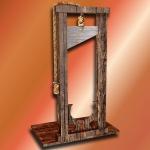
Satire can be done well, or badly. I critique an example of the latter.
*****
First of all, let me preface this by saying that I love satire and sarcasm (done in the right way). I’ve analyzed it, and I’ve often utilized it in my apologetics. I’ve satirized atheists, and caught hell for doing that. I did a very pointed satire of theological liberals, using Silent Night as my vehicle. In December 2017, this latter article was vastly misunderstood when I posted it at National Catholic Register. But it was perfectly valid. The readers who blasted it in comments simply didn’t understand its purpose, or how satire works. I’ve satirized anti-Catholics times without number, including fictional dialogues and take-offs of famous songs, with re-written lyrics. I’ve had fun with pictures and cartoons and caricatures of anti-Catholics.
The following critique, accordingly, has nothing to do with any dislike of satire or parody per se. It has everything to do with a strong dislike for satire done badly, in an insulting, misleading way that goes beyond merely poking fun: which gives satire and sarcasm — already widely misunderstood and disliked, as it is — a bad name. Catholic philosopher Edward Feser recently exhibited this shortcoming, in my humble opinion. When I pointed this out in his combox, it became (sadly, predictably) a huge, ugly controversy and I was set upon by the cheerleaders and rah-rah club in his comboxes.
Dr. Feser put up a post on his blog, entitled, “A lexicon for the capital punishment debate” (12-29-17). This was his take-off on his many opponents in the capital punishment debate (he being a big advocate for it). Many of the entries were non-objectionable and even funny. But some were, in my opinion, unethical and not funny at all, because they insinuated lying and dishonesty on the part of the recipients. Yours truly was included in this. Here are those three:
fastiggious, adjective. Fussily deferential to doctrinally imprecise and non-binding papal statements. “Bob has gotten so fastiggious lately. He’s convinced that even the pope’s doodles are magisterial.” [about theologian Dr. Robert Fastiggi, a personal friend of mine]
grisez, adjective. Portmanteau of griff and blasé. Excessively confident in the consistency of a novel view with orthodoxy. “Germain casually waves aside millennia of consistent Catholic teaching, which strikes me as grisez.” [about Catholic moral philosopher Germain Grisez, who just passed away yesterday, as I sadly found out when looking up his name]
armstrong, verb. Boldly but casually to insinuate a falsehood in the hope that others will go along with it. “Dave tried to armstrong me into a debate. Can you believe that guy?”
What follows are my comments in the combox. For brevity’s sake, I won’t include the voluminous feedback to these comments (most of them were either non sequiturs or personal attacks, anyway):
***
Thanks, Ed, for the insinuation that I am characterized by zealously setting forth falsehoods. Very scholarly and charitable of you. I thank you at least that you didn’t include the notion that I spread lies, knowing that they are lies.
And you go after Bob Fastiggi as a supposed mindless ultramontanist. Very original. As usual, anyone who defends papal views is caricatured as a mindless idiot, who thinks the color of the pope’s socks is a de fide matter.
It’s not funny satire if you engage in wholesale lying about someone else. It has to be based on something true about a person.
Satirical exaggeration has to be based on truth to be 1) effective, and 2) funny. When Ed thinks of me, he thinks that what is characteristic of me is to “Boldly but casually to insinuate a falsehood in the hope that others will go along with it.” That sums me up better than anything else! I’ve devoted the last sixteen years of my life to full-time defense of Holy Mother Church, but this is what sums me up. I can see that an anti-Catholic or an atheist would think that, in their profound disagreement and negative appraisal of Catholicism. But a fellow orthodox Catholic? Just because we honestly disagree on capital punishment?
For Bob Fastiggi, it is supposedly being ultramontanist. If you defend the pope and follow the obvious Mind of the Church in recent times on capital punishment, well, that is slavish blind faith and an extremist obsession.
Ed had already savaged Dr. Fastiggi in his published articles, implying in one, even in the very title, that he was fundamentally dishonest as a theologian and scholar. Bob had never attacked Ed. He never attacks anyone. He sticks to ideas, as scholars should.
So, insinuations of the same nature sent my way or towards others like Grisez, come as no surprise. It appears to be somewhat of a modus operandi for Ed. How pathetic and sad.
Germain Grisez “casually waves aside millennia of consistent Catholic teaching.” That is its own refutation. It’s certainly not funny. Heterodoxy never is. And falsely accusing someone of same never is, either.
I have thought for years now that Ed was a great scholar and linked to him many times. If you go back and see the tempest-in-a-teapot on this blog a while, back, you’ll see how deferentially I approached him. He still may be a great scholar, but this post is indefensible.
Personal attacks of this sort are unbecoming of a scholar and disgraceful for a Christian to engage in. He even included the pope, because it’s so fashionable and chic to bash him today.
***
And of course, Tony [a very active commenter there], we notice that when you and Ed satirize yourselves, there is no moral judgment or personal attack. Those things are funny because they don’t lie.
They highlighted and exaggerated morally neutral, harmless traits that really are there. It’s just having fun. If the satirical piece had stayed in that vein throughout, I would have no objection to it whatever, as a lover of satire, and not infrequent composer of it myself.
Lying about others is neither fun nor clever. It’s mortal sin.
***
You [Greg] call it merely “friendly ribbing.” But even others on this thread disagree with you. “Anonymous ” thinks it’s about: “sometimes you need to light people up who just insist on being foolish.”
For him / her / it, what’s going on is rightly dishing out deserved criticism to fools. I wouldn’t go that far, but in my opinion, that’s closer to the truth of the intention than your neutral “friendly ribbing” that intends little or no judgment.
Moreover, we know that Ed has characterized Dr. Fastiggi as a dishonest scholar even in his serious published replies to him.
I don’t think he’s a completely different person when he’s doing humor. It carries over. So the tendency to characterize others as dishonest or devious was smuggled into the “caricatures” of folks like me and Dr. Grisez as well.
In other words, even satirical humor has a background in thought, especially if it is pointed and acerbic, as this assuredly is. Satire by nature always attempts to make a point. Even though Ed is poor at satire, he’s still definitely making his points.
***
Holding a realistic severed, bloody head of Donald Trump was considered hilariously funny, too. Many millions of people, including myself, didn’t consider it funny at all. Theological humor, like political, appears, then, to be funny to various degrees in the eye of the beholder.
***
Poking fun at harmless, trivial stuff, as Ed and Tony did with themselves, is friendly ribbing. Just by mere coincidence, neither of them attribute very serious faults or shortcomings to themselves; only when it deals with others, do they do that and think it is hilariously funny. Ed would never dream of satirizing himself as peddling falsehood, thinking it is the truth, or thumbing his nose at 2000 years of Catholic tradition.
Attributing terrible, serious faults to someone else is not funny: especially if the things aren’t true. That’s not an exaggeration; it’s a malicious invention.
It’s not a matter of me being unhumorous or not being able to laugh at myself. As I said, I do satire myself (quite a bit). I have a huge sense of humor and love to have fun, as anyone who knows me in person knows full well. Here’s an example of a satire of me that was done as it should be: exaggerating a real trait and poking fun. I died laughing over it.
That guy knows how to do satire; he’s very good at it. I can’t laugh, however, at a downright falsehood or lie about myself or any of the others falsely characterized. That’s simply not funny. It only is if someone has already formed a quite negative impression of another person. Then the assumed, supposed negative characteristics of them — satirized — are wildly funny to them and others.
Thus, it appears that Ed and Tony have already formed this low view of me (and the others who were mocked as virtual fools and idiots), so that when it is made fun of, they think that’s really really funny, and indeed, Tony can’t even imagine a better caricature of me than the one drawn above.
And here I was naive and idealistic enough to think that we were simply having an honest disagreement among brothers of Christ, that we could discuss in a friendly manner, without the personal attacks . . .
Another weird thing about Ed’s “satire” of me is that Ed is (for humor’s sake) referring back to the incident when I first appeared here. It was a mistake on my part, but a perfectly innocent one. I apologized at the time: “My apologies for any misunderstanding. That was my fault.” [see the tempest in a teapot regarding that, from an earlier Feser post and thread]
Several others who know me better defended me on the thread, too. That should have been the end of it. But now Ed is taking a shot at a thing that I already apologized for.
Is that a particularly Christian approach, either? Aren’t we supposed to forgive and forget stuff when someone apologizes? I was taught that as an evangelical Protestant, and to my knowledge, the Catholic Church agrees with that moral and relational principle. It’s elementary Christianity.
[Last night, about a month after my previous comments, I reacted to what was written about me on the thread. I modify it slightly here, and add two sentences]
We have seen tons of BS and non sequiturs in response to my remarks about the sarcasm: mostly to the effect that I am supposedly remarkably thin-skinned and oversensitive [e.g., Tony: “it is apparent that Dave cannot bear to be made fun of on this point and keep his temper.”]. Of course, that’s not true at all. I wouldn’t last two weeks as an apologist if that were true. In fact, I have been constantly active in writing apologetics for now almost 22 years online. If anyone is under the illusion that that doesn’t involve an avalanche of personal attacks, you don’t have the slightest idea what you are talking about.
If I were what is claimed here, that simply would never have been the case. It makes no sense whatsoever; has no plausibility whatsoever. The foolish pride of a person who is actually the way I have been falsely and ridiculously described here would have never been able to take it for 22 years.
I have no problem laughing at myself. Any father of teenagers quickly learns that art (I have four children). I gave an example of a satire at my expense that was actually good and on the mark. That was laughing at myself. But no matter. That was a rational reply, and the “discussions” that have been about me here (rather than the issue at hand: the satire) are anything but rational.
This bum rap is not the issue. It’s just the nonsense that’s been thrown out to avoid talking about the actual issue involved. We have psychoanalyses and empty / boneheaded charges, but very little in the way of actual arguments. I made several objective, rational arguments that can be reasoned with, about the nature of sarcasm and whether these instances were poor and poorly reasoned examples of it.
I initially expected at least a slightly higher calibre of comments on the blog of a very good Catholic philosopher. Silly and idealistic me . . . I was naive and foolish enough to still believe that the blog combox of a philosopher would actually be devoted to fair-minded and inquisitive philosophical / ethical discussion, rather than manure pie-throwing and the immediate attack upon anyone who dared to utter an opinion different from the Prevailing Forum Orthodoxy. I foolishly assumed that folks (at least on this site) would understand that opposing arguments are opportunities for intellectual stimulation and challenge; not opportunities to lob yet more infantile personal attacks.
It actually could have been a very interesting discussion, because satire and humor in general make for very fascinating discussion, if they are actually analyzed. I would have loved to engage in that discussion. Even the comments that had a semblance of rationality and seriousness were so polluted by the poisoning of the well that engagement with them would have been perfectly futile.
It was a chance for Dr. Feser to ponder whether, in fact, he had gone too far with his humor, but alas, he showed no interest in any critique along those lines. I think that’s his loss, and that it is well for all of us to ponder constructive criticism, since all of us are not perfect beings, and it’s easy to become excessive in humor. I’ve done it (as a guy who absolutely loves humor and laughing and having fun, and especially satire) many times, and have apologized many times.
[Dr. Feser replied to my initial comments, and I counter-reply now]
Dave, for goodness’ sake, lighten up. It was quite obviously meant as nothing more than a joke.
Also, kindly get over this delusion of yours that I “savaged” Fastiggi or was in any way unkind to him in our CWR exchange. I did not say that he was intellectually dishonest. To say to someone “I think that intellectual honesty should lead us to conclude such-and-such” is not the same thing as saying “You are intellectually dishonest.”
Well, as I have cited here before, Dr. Feser wrote an article in Catholic World Report, entitled, “Catholic theologians must set an example of intellectual honesty: A reply to Prof. Robert Fastiggi” (10-30-17).
I grant that that possibly could be interpreted in the non-offensive fashion he describes, but it’s a very poor choice of words for a title, indeed. Imagine if I wrote an article, entitled, “Catholic philosophers must set an example of intellectual honesty: A reply to Prof. Edward Feser”.
Now how would the average reader interpret that, if not as casting aspersions on his intellectual honesty? Why put that in the title at all? It’s clearly a very provocative statement, even if we grant that he meant it in his less offensive sense.
How did Dr. Fastiggi reply in the combox? True to form, as an unfailing gentleman, he wrote: “I agree we must set an example of honesty. That is what I am trying to do.”
Now, how do we interpret that? I think it can plausibly be interpreted: “Yes, I agree that we theologians should be honest (over against your insinuation that in my case, that is untrue). My intention is always to be so, and we simply have an honest disagreement.”
Why would that come up at all, if not for the reason of questioning intellectual honesty? Why would Dr. Fastiggi have to spend one minute of his time clarifying that “I am trying to [be honest]”? Of course he is. In good dialogue, that is always assumed beforehand on the part of both persons, regarding their opponents.
Now, in his recent article here about Dr. Fastiggi, Dr. Feser charitably writes (after taking yet another shot at me, calling me “one of his more oversensitive admirers”):
I admire Prof. Fastiggi for his unwavering dedication to the Church, for his erudition, and for the unfailingly gentlemanly way he has engaged his critics both in the debate over capital punishment and in the other, often heated, theological debates that have arisen during the pontificate of Pope Francis.
Yeah, me, too. Then why make any allusions to intellectual dishonesty in the title of an article in reply to him? And why is it so excruciatingly difficult to comprehend how someone can easily interpret such a title as I suggest: even if that was not the intention? Why not, rather, entitle the same piece, “Catholic Theologians Must Hold that Capital Punishment is Permissible Under Catholic Moral Teachings: A Reply to Prof. Robert Fastiggi”?
That boils down to what Dr. Feser is arguing in his objection to my objections above. And he follows this theme in his recent piece: Catholics can scarcely (impossibly?) conclude anything other than his own position.
Therefore, if there is only one conceivable position, it follows that a theologian of the stature of Dr. Fastiggi disagreeing with the unarguable TRVTH must be intellectually dishonest or quite dense and dumb (as an alternate).
Sorry to disagree again (I know that’s a naughty no-no here), but that’s how I see it. I think, and here I disagree with Dr. Feser. It happens. You’ll all live through it and survive my outrageous interruption of the tranquility of your safe space.
***
Photo credit: Old magazine cover from February 1950 [public domain / Wikimedia Commons]
***













